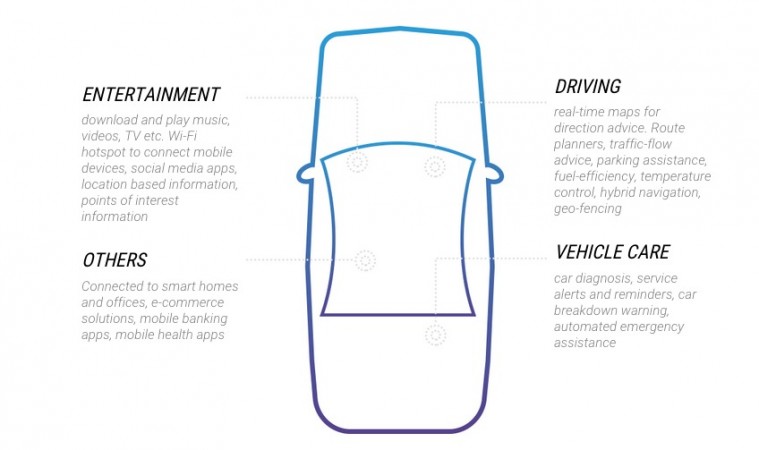Connected Cars: Redefining the driving experience
Remember Samuel Jackson in ‘Captain America: The Winter Soldier’, controlling his car just by talking? Imagine how exciting it would be to do the same with your own car; no hand-eye-leg coordination, just simple verbal instructions! Although that’s something a long way away, the first step towards that has been taken in the form of connected cars.
When we remain connected to everyone always, why disconnect while driving? Efforts are being made to keep us connected without risking our lives. Connected cars is the latest revolution in the field of automobiles.
Technology on wheels
According to McKinsey, connected car is a car which can optimize its own operation & maintenance as well as convenience & comfort of passengers using onboard sensors, mobile apps & internet connectivity. Safety-related systems are likely to be based on a new fast, secure & reliable technology called Dedicated Short Range Communications (DSRC) which is similar to WiFi.
Embedded Telematics Control Unit (TCU) offers a host of functions including e-Call, fully automated accident alert, remote control locking, etc. GPS tracking system & GSM module are enabled in it to help provide those services. TCU also acts as data modem for other devices in the car connected to MOST (Media-Oriented Systems Transport) bus. TCUs are also bluetooth enabled so one can simply switch on the apps they want to connect to their car and connect with the infotainment unit where all the apps will be displayed just like on the mobile screen. There is an option to type in that same screen so you can have social connectivity. Voice has also been enabled to help in navigation and reading out messages while driving so that you don’t risk your life by looking, and yet receive messages, send mails, etc.
What’s driving the connected car market?
The McKinsey report further predicts an increase in global market for connectivity components & services to almost €170bn by 2020 from the present €30bn. A few benefits behind surging demand for connected cars include:
- Complete information to driver about car performance so that proper maintenance can be done.
- Makes driving seamless & safe.
- Real-time data helps in smooth flow of traffic by providing information beforehand about traffic jams, etc., and also simultaneously suggesting alternate route(s), thus saving time.
But there are challenges ahead…
Cars take longer to develop than smartphones. Since phones get updated frequently, it’s important that cars’ software be simultaneously adopted and upgraded as well. Also, carmakers need to partner with mobile makers like the way Chrysler partnered with Sprint Nextel for Dodge Viper, for example. The additional cost of frequent services & updates will have a negative effect on demand, especially in the price-sensitive markets. Data security and privacy are also a concern for many buyers.
Renault, Ford, Lexus, Nissan, and Audi have already adopted connected technologies for cars and the future seems to be of connected cars. However, for its rapid and broad adoption, manufacturers have to address the challenges and make the car affordable to a large number of buyers.
Tags: Connected Cars
![Blog-[x]cube LABS](https://d6fiz9tmzg8gn.cloudfront.net/wp-content/uploads/2016/06/blog_banner.jpg)


